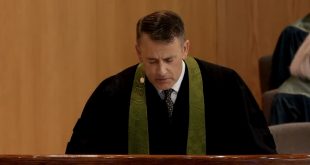Just days after the Texas Senate passed a measure requiring the Ten Commandments to be displayed in every public school classroom in the state, the ACLU and other civil liberties organizations announced they will sue the state to stop it from being enforced.
The bill was sent to the desk of Governor Abbott, who’s expected to sign it into law, after the Republican-controlled legislature approved it Wednesday.
GOP lawmakers worked over the holiday weekend to pass an amended version of the bill requiring the state to defend against any legal challenges, rather than the school districts.
The bill, known as SB10, was sponsored by Sen. Phil King (R-Weatherford) and requires every classroom to visibly display a poster that’s at least 16 by 20 inches featuring a specific version of the Ten Commandments. The poster can’t include any text other than the language laid out in the bill, and no other similar posters may be displayed.
“It is incumbent on all of us to follow God’s law and I think we would all be better off if we did,” Rep. Candy Noble (R-Lucas) said during the House vote.
“Placing the Ten Commandments and national motto on schoolhouse walls is a great way to remind students of the foundations of American and Texas law. And bringing state law in line with what the U.S. Supreme Court has said about prayer in schools should make it clear to school administrators that student and teacher prayer is completely Constitutional. First Liberty was grateful to support these important bills and looks forward to them being signed into law by Governor Abbott,” said Matt Krause with First Liberty Institute.
Critics argue the bill violates the Establishment Clause of the First Amendment, which prohibits the federal government from creating a state religion.
The ACLU and the ACLU Texas joined Americans United for Separation of Church and State and the Freedom from Religion Foundation in announcing plans Thursday to challenge the legislation requiring schools to post the Ten Commandments.
“S.B. 10 is blatantly unconstitutional. We will be working with Texas public school families to prepare a lawsuit to stop this violation of students’ and parents’ First Amendment rights,” the ACLU wrote, calling the measure “religiously coercive.”
Supporters of the bill argue that U.S. Supreme Court decisions, including Kennedy v. Bremerton School District, would allow SB 10 to hold up in court.
“For 200 years, the Ten Commandments were displayed in public buildings and classrooms across America,” wrote King in his bill analysis. “The Court has … provided a test that considers whether a governmental display of religious content comports with America’s history and tradition. Now that the legal landscape has changed, it is time for Texas to pass SB 10 and restore the history and tradition of the Ten Commandments in our state and our nation.”
On the other side, ACLU Staff Attorney Chloe Kempf contends that the U.S. Supreme Court’s decision in Stone v. Graham, which struck down a similar Kentucky law, still applies.
“The Supreme Court has never overruled it. And in fact, in more recent years, including in the Kennedy case, the Supreme Court has affirmed that there is a special constitutional concern when we are indoctrinating students in school with religious messages,” Kempf told KXAN-TV. “The Kennedy case…really has no relationship to a bill that requires a religious text to be posted in schools.”
The new legislation is a reflection of Texas’ move, in recent years, to bring faith back into the public school sector.
The state Senate also passed SB 11 and SB 965.
SB 11, also known as “Protecting the Freedom to Pray in Schools,” allows a period for prayer or religious study, and SB 965 allows a public school employee to engage in religious speech or prayer while on duty.
In 2021, Texas passed a law requiring schools to display donated “In God We Trust” posters if they were donated by a private foundation.
As CBN News has reported, the Texas State Board of Education signed off on a Bible-based curriculum for elementary public schools.
The “Bluebonnet” textbook provides optional course material for kindergarten through fifth-grade students.
The curriculum was designed with a multi-disciplinary approach that uses reading and language arts lessons to reiterate concepts in other subjects, such as history or social studies, according to the Texas Tribune.
So kindergarteners would learn about the “golden rule” through a lesson on the story of the Good Samaritan, found in the Gospels. Or students would learn about the significant role Jesus played in artwork such as Leonardo da Vinci’s painting “The Last Supper,” a Guardian report explains. A poetry unit for fifth graders would examine the Book of Psalms from the Old Testament alongside poems from Robert Frost and William Carlos Williams.
Adopting the curriculum is optional for schools. However, they would receive additional funding, $60 a student, if the school participates.
Louisiana and Arkansas have also passed similar legislation requiring classrooms to post the Ten Commandments.
The Louisiana measure faces a court challenge which has not been decided yet.
***Please sign up for CBN Newsletters and download the CBN News app to ensure you keep receiving the latest news from a distinctly Christian perspective.***
Source link




